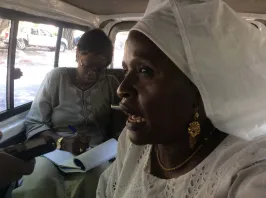Deborah Mesce
Former Program Director, International Media Training

March 21, 2018
Former Program Director, International Media Training
In Senegal, journalists’ reporting on reproductive health issues has drawn policymakers’ attention and spurred action, contributing to a doubling of the country’s modern contraceptive use in less than a decade. Where family planning stockouts were once the norm, now most supplies are restocked regularly to keep up with demand, and task-shifting has alleviated many of the problems caused by staff shortages. In addition, a national campaign promoting birth spacing raised awareness about family planning. But work remains in hard-to-reach areas; while use of modern contraceptive methods has reached 31 percent in urban areas of the country, use in rural areas is only 17 percent, according to the 2016 Demographic and Health Survey.
The connection between journalists’ work, policymakers’ priorities, and advances in a population’s well-being is one that PRB’s study tours aim to foster. Study tours get journalists out of their newsrooms and into areas of the country where needs are greatest, where they can see the problems first-hand and talk to the people affected. PRB’s training provides journalists with the skills to understand and communicate news related to population and reproductive health, and they become better equipped to hold governments accountable.
[article-media image_id=”8181″ caption=”Maimouna Guèye interviews a member of Parliament, as found in her December 7, 2017, article in Le Soleil.” size=”article-media–small” alignment=”alignright” /]
Work by the PACE—Policy, Advocacy, and Communication Enhanced for Population and Reproductive Health—Project and PRB-sponsored journalists help keep family planning and reproductive health access a priority for Senegal’s Ministry of Health. Two study tours in 2017 focused on reproductive health challenges in Senegal’s Diourbel region, about 100 miles east of the capital city, Dakar.
In May, eight journalists (Dakar-based and local) spent three days visiting this region, which is one of the nation’s religious centers, to report on religious obstacles and lack of access to reproductive health services and family planning.
During a second tour in October, seven journalists from Dakar along with local reporters visited the most impoverished area of the Diourbel region and talked to representatives of civil society organizations and local political leaders about their efforts to increase access to reproductive health care services, including family planning.
Senegal’s Ministry of Health and Social Action (MoH) suggested Diourbel for the study tours because reproductive health services are not always available and use of family planning in the region is low, at least in part because of a widely held belief that Islam opposes the use of contraception. More than 90 percent of Senegalese are Muslim.
The study tours, supported by the United States Agency for International Development’s PACE Project, led journalists to produce more than 40 print and radio stories, including two three-page spreads by Maïmouna Guèye in the national newspaper, Le Soleil. The journalists identified key barriers that prevent access to high quality reproductive health services. For example, midwives at the district medical center in Mbacké deliver 20 to 25 babies each day without an obstetrician-gynecologist or an operating room. The journalists also reported on large geographic disparities in contraceptive use among Diourbel’s districts, particularly in more rural areas that have been neglected by the government. According to the region’s reproductive health coordinator, the MoH found those stories especially useful in their policymaking considerations.
Reporting by Maïmouna Guèye in Le Soleil is one of the reasons the Senegalese government has focused attention on family planning. A top health official says that Guèye’s coverage of the 2009 International Conference on Family Planning in Uganda, which she attended under PRB sponsorship, served as a tipping point of sorts for the MoH. Dr. Bocar Mamadou Daff, former director of the Reproductive Health and Child Survival Unit in the ministry, says Guèye’s stories from the conference provoked so much reaction within the MoH that Dr. Daff resolved to make family planning a national priority. Along the way, and with Dr. Daff’s encouragement, PRB has equipped a cadre of Senegalese journalists to report responsibly and frequently on reproductive health and voluntary family planning.
Other study tours and workshops for Senegalese journalists have also drawn policy influencers’ attention, as PRB trains journalists to hold public officials accountable. For example, a PRB-trained reporter revealed that the roof over the urology department at Dakar’s main hospital was collapsing, impeding corrective surgery for fistula. The article prompted the MoH to quickly earmark funds for its repair. Over the years, other stories produced by PRB-trained journalists have had similar effects, such as the identification of contraceptive logistics bottlenecks and health staff shortages.
Learn more about PRB’s approaches to strengthening media capacity to report on family planning and reproductive health through our online media toolkit.
